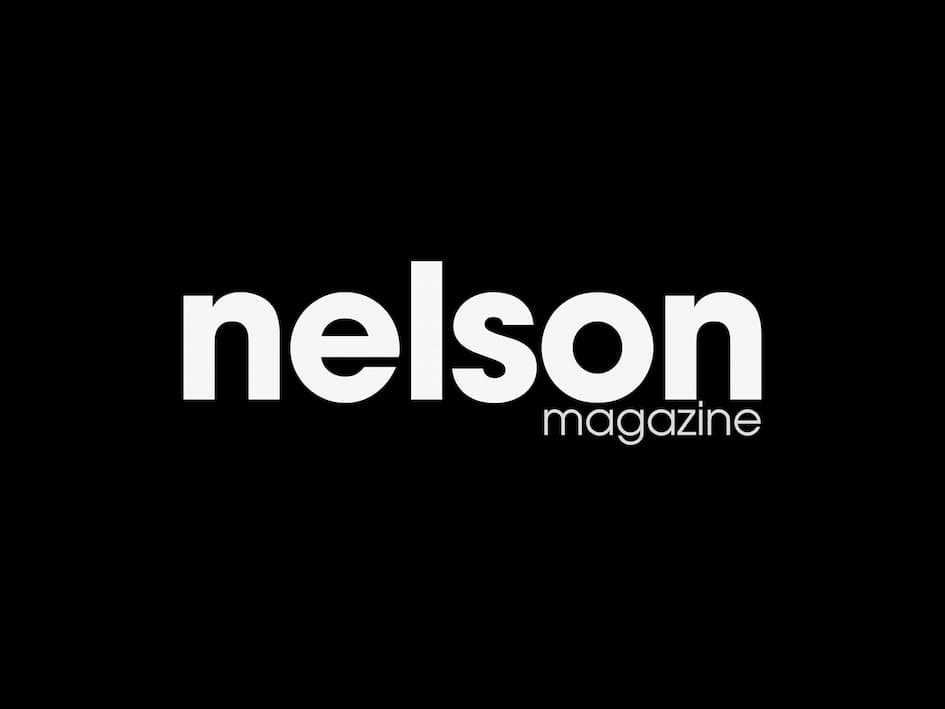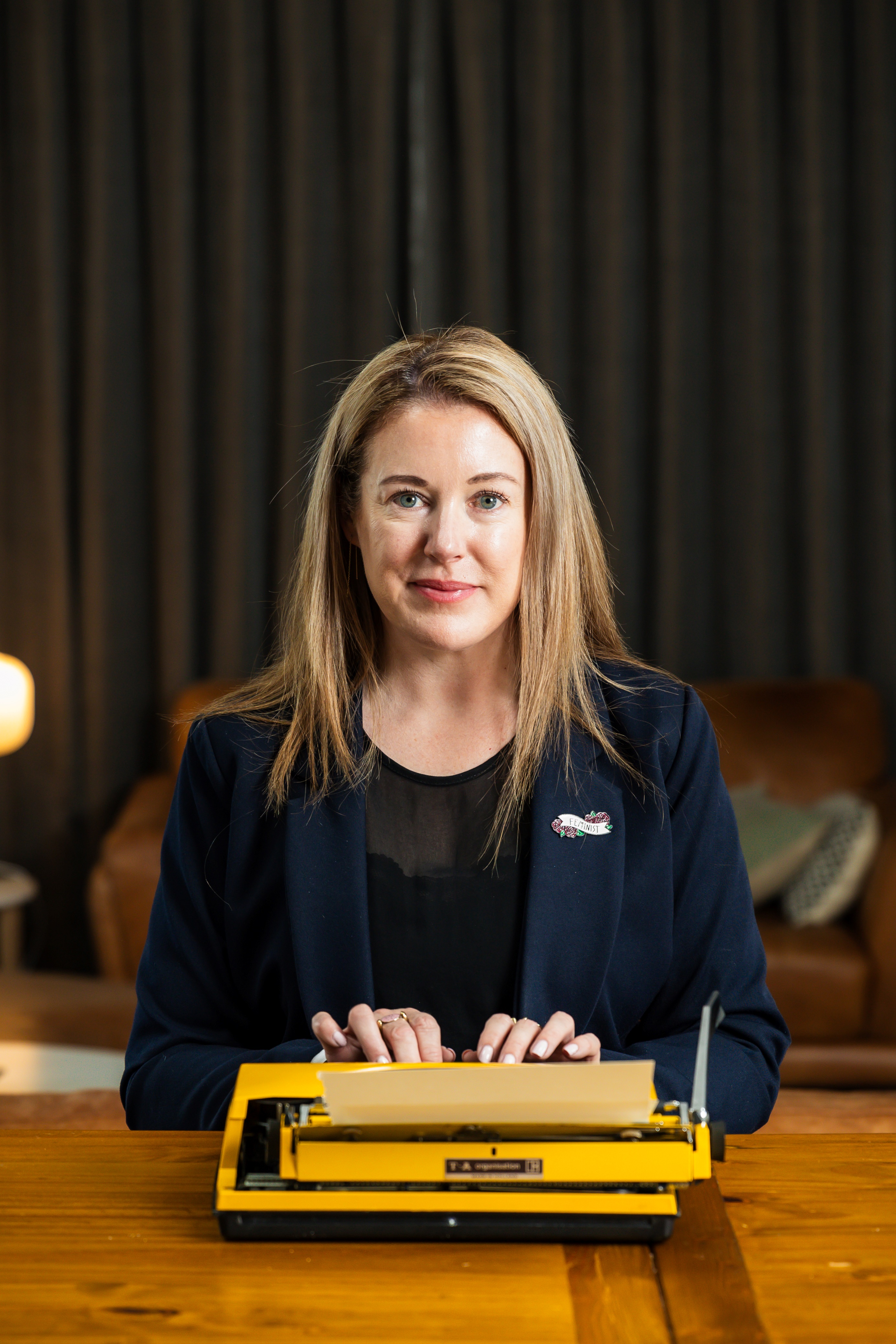The guerrilla poet


Zines creator Rowan Taigel. Photo: Tessa Claus
While the simple haiku occasionally finds favour, these days a poem would need to be recited by visiting extraterrestrials to get our attention. Or maybe not. Britt Coker speaks with a local poet who has found a creative way to slip poetry into the picture to ensure it gets seen.
Roses are red, violets are blue, what’s the point of poetry when there’s Netflix to view?
Rowan Taigel will say there is very definitely a point to poetry. If not found in the reading, then in the writing. Rowan began composing poems when she was about eight years old, and her career path didn’t veer too far from this early pastime; she’s been an English teacher for 20 years. In her spare time, she’s still a rhyming mission-maker, connecting people with poetry by stealth. I’ve ruined the surprise now, so act shocked when you see it coming. If you recognise it.
How do you hide a poem? Rowan lays it flat, breathing shallow between eight pages of a little zine. She causes a distraction with pictures while the words spread from page to page to page until The End. You’ve suddenly read a poem without feeling a thing. But hopefully you did.

If your eyes paused over the word zine, you will not be alone, though the term was first used way back in October 1940 by science fiction fanatics who were creating fanzines. A zine is a small-circulation, self-published work of texts and images, usually reproduced using a photocopier.
Rowan describes a zine as, “bigger than a card, but smaller than a book; little bite-sized mini magazines. And each one of mine contains a single poem. It's just a more tactile and engaging way, I think, of connecting people with poetry… The cool thing about zines is that you can make a zine about some things that are incredibly important; really serious, important issues like climate change, through to what's in my handbag, and anything in between… They're a space for youth counterculture or marginalised communities to have their voices heard and shared when mainstream media or publications aren't quite willing yet, or a bit nervous to, publish their ideas. Very DIY culture, I guess.”
So, in a zine her poems go. But what’s so great about poetry anyway?
“I think to me, it's a lot like music in that it’s universal. I think you find it in every culture – where there is music, there is poetry. Musical lyrics are poems. And I love the precision of the language, and yet, juxtaposed with it, there's that precision, but also the vast potential within metaphor and imagery to be able to connect or to support people in their own way, I guess, with their life, with what they're reading… The little images or vignettes that can be created with so few words actually make them more accessible than people stereotypically believe.”
Rowan wants to dispel the stereotype of poetry being inaccessible or incomprehensible, best suited for tortured, emotional intellectuals. Happy, contented people can read poems too.
She loves the edginess of New Zealand poets like Tracy Slaughter and Hera Lindsay Bird, describing poetry’s accessibility through their use of the everyday vernacular. “I like that idea that you’re thinking, okay, I'm picking up a poem, and poetry needs to be this highfalutin’ thing, but there’s swear words in there, and discussions of the latest fashion, or connections with gender or feminism or sex. I think there's a lot to be discovered for people, especially with New Zealand poets – they’re amazing.”
It’s better than tv/to look at someone and feel so much happiness/your smile a single arrow, quivering in a tree trunk. - Hera Lindsay Bird.
Since poetry is a solitary past time that someone is rarely commissioned to write, how do you know if you’re any good, (presuming it even matters)? External validation can be thinly felt through the applause of family and friends, but poetry publications carry more weight since they will generally receive many more submissions than they have pages to put them on. Rowan has had pieces published in most of the major New Zealand literary journals and a couple overseas. So that’s gratifying, but they’re mostly a form of sharing. Concertinaed in those zines is still her primary modus operandi.
So, how to make a zine. Rowan starts with an A3 piece of paper and folds it into eight panels. She takes images and pages from vintage children's books or arty magazines and pastes her typed poetry on to each page. And when I say typed, I mean she has put a piece of paper into an old metal typewriter and punched out the letters like we did long ago in the medieval 1980s.
“I type all the poems out on my typewriters and then hand-collage them, so I don't use anything like Canva or any other sort of digital platform to make my zines. I make one original zine all hand-cut out with my little craft knives, and will often hand paint backgrounds with watercolour… I guess each original zine can take anywhere between five to 20 hours all up, to make. I've collected hundreds of books and magazines, and I go through them all constantly. Every time I write a new poem or decide I'm going to make a zine about a particular poem, I really take time to match the imagery that I'm wanting to put across, either literally with the text or the metaphors… I like them to be cohesive through the whole scene, so, the colour palette and tonal aesthetic support the power of the words. Again, my mission being to try and make the poems accessible and interesting and engaging for non-poets, as well as poets.”

In the process of finding a typewriter to create her zines, Rowan became a typewriter collector. Technically, you only need one typewriter to do the job, though Rowan may argue that five is actually the correct number – since that is the number she currently owns. Pending status. Always room for more, says the collector. But she’ll never forget her first love.
“Someone in Wellington on TradeMe was selling this amazing yellow typewriter, and I just saw it and I thought it just looked so cheerful and happy, like a ray of sunshine. I thought, ‘Oh my God, I've never seen a yellow typewriter,’ and I just bought it. I hadn't used a typewriter since I did typing lessons when I attended high school, and I put that little piece of paper in and rolled the roller and sort of snapped the keys, and it was just so satisfying, that tactile sensation of pressing each key, seeing it, I mean, each letter is instantly published, right? It's on the page. There's no need to go ‘File Print’. There's no delete button either, so you have to roll with typos. It really helps me deal with my perfectionist tendencies.”
That perfectionist streak also gets a workout when it comes to typewriter choice, as Rowan says they all have a different feel (or font), so she tries to match the typewriter with the poem. She recognises that no one else will know or appreciate it, but it’s part of the creative process for her.
Vintage typewriters don’t always age well, so she counts among her blessings a father who happens to be a tinkerer and inventor. Her recent acquisitions all get sent to him for a service because sticking keys, and dust and dirt amongst the crevices, are no match for a tinkering dad with a tiny vacuum and an oil can. Rolled out of his workshop, they’re good to go.
Piercing through skin and bone/ my poetry gun would tattoo the soul-/ words would well like beads/ of blood to richly stain the heart/ with a healing wound/ in which would remain/ an everlasting invisible ink. – Rowan Taigel.
We barely have to handwrite anymore. We don’t even have to type that much, with transcript tools readily available on our phones and social apps. Does it matter if we don’t hold a pen between our fingers, or, as each day passes, is that creative lightbulb dimming inside our heads?
“We use computers so much these days and I love my technology, but it uses a different part of your brain. When you're physically moving your hand to make words come out in that way, it just activates different areas in your brain, and when you're typing, there's a certain amount of coordination and rhythm that you need, that you sort of get into. So, it does something in terms of opening up or sparking synapses. It just makes me think differently when I type.”
Rowan started a class at her college called Guerrilla Publishing, as a way to support her students to get their words and ideas expressed in a less intimidating format.
“Rather than having to submit their work to journals, it was to just produce our own collection, which we did publish in a book. But also, they all produced zines about things of interest to them, and it's kind of a non-threatening, fun, tactile way to produce their own work. And it's instant publishing.”
Using zines as a vehicle for her guerilla poetry, Rowan inadvertently discovered something about herself – she is an artist as well as a poet. Initially she had to be ‘gently convinced’ of this by others, but a good thing too, because it inspired her to apply for an artist residency at Zappekin Studios in Tasman. A residency she was subsequently offered, and early this spring she spent eight weeks writing poetry and being a zinester artist. The residency, alongside two other artists, culminated in an October exhibition.

“It’s inspirational. It's a dedicated art space which is really nice for someone who normally sits at my kitchen table surrounded by my normal life, and tries to focus on producing art, not getting distracted by what's for dinner. They've provided us with basically 24/7 access to that space and some funds to purchase any materials we might need, and then, obviously, just the amazing connections with the other artists and allies who support the Zappekin collective, and that's been my main reason for applying. It's just wanting to find a way to connect with the art community in Nelson.”
At Labour Weekend, Founders Park also hosted Nelson’s first Zine Fest where she exhibited and sold her eight-folded poems. Although the Zine Fest is new to Nelson, Rowan says the zine scene has a strong following in other cities around New Zealand with long-running festivals in Wellington and Auckland. More and more people are becoming zinesters, too. As we immerse ourselves further into the world of new technologies, for some people, there will always be an innate desire to find our natural flow state immersed in a creative expression that brings them joy. But if you could just read a poem occasionally, that would make Rowan Taigel happy too.
